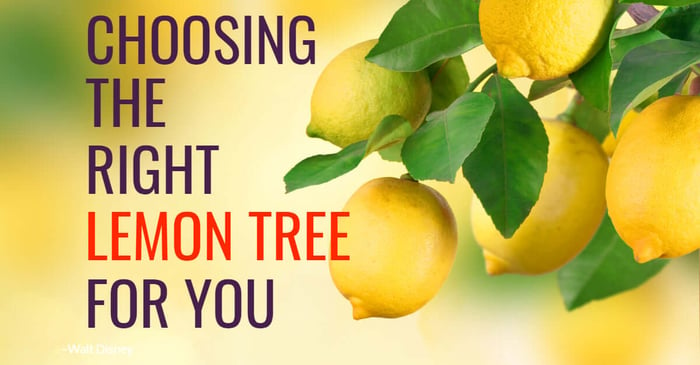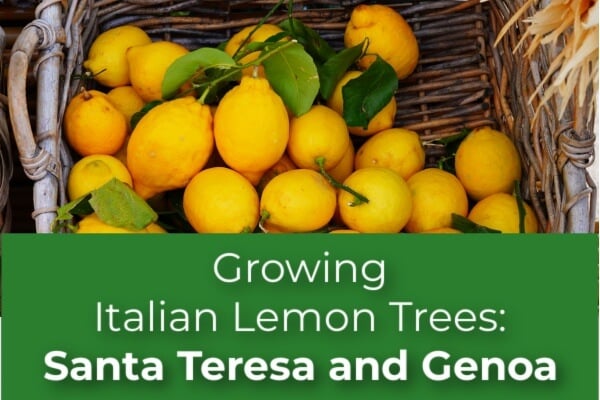Table of Contents
Eureka, Lisbon, Improved Meyer, Santa Teresa... There are so many varieties available to grow yourself, how do you choose the right lemon tree?
Choosing the right lemon tree sounds easy enough, until you look online and see that there are actually quite a few variety choices and options available. Then the choice can seem more daunting! Especially if you just want to grow one in your yard without a lot of fuss.
In order to successfully grow a lemon tree and lemons, a few factors come into play. Like, where will it live? In a pot or in the ground? Do you live in a climate where it can live outside all year round (USDA Zones 8-10) or will you have to move it to a warmer or cooler location, depending on the season?
Lemon trees, especially those grafted onto a semi-dwarf rootstock like ours, are hardy enough to live in an outdoor/ indoor situation or even an indoor-only situation, as long as their needs are met throughout the year.
Like all citrus trees, lemon trees are evergreen, meaning they do not go dormant in the winter. That means that they will need year-round care. This is easier is they are able to live outside all winter, but can be done successfully indoors as well.
Lemon trees thrive in pots and containers even if you are not able to plant yours in the ground due to climate restrictions or space.
Improved Meyer Lemon
For both outdoor and indoor growing, container and in the ground, the Improved Meyer Lemon Tree is the most popular choice, especially in California. It is believed to be a cross between a lemon and a mandarin, which makes it a sweeter version of a traditional lemon. It has thin skin, few seeds and is very juicy when ripe. The fragrant blossoms are white an purple. Meyers are considered to be everbearing, meaning under the right conditions, it can produce flowers and fruit year round. If you are able to provide adequate light, water and potting soil, a mature Meyer Lemon tree will always have flowers or fruit hanging on it.
You can use Meyer lemons in any recipe that you would use a regular lemon, with the amount of sugar reduced to account for the sweetness that the Meyer brings.
Eureka and Lisbon
As far as growing citrus, if you prefer a more tradition lemon flavor, I would recommend a Eureka Lemon Tree, known for it's vigor and abundant harvest of lemons each year. The Lisbon Lemon Tree, from Portugal, has a classic strong classic lemon flavor, thin skin, and is very juicy. They are typically seedless.
The Eureka and Lisbon lemons are the type of lemons that you would find in a grocery store. They have thicker skin than the Meyer Lemon and a both have a similar yet delicious classic lemon flavor. The zest is also wonderful, fragrant and flavorful.
Santa Teresa Feminello and Genoa
Lately, and perhaps due to the popularity of limoncello, a growing choice has been the Italian varieties. The Santa Teresa Feminello Lemon Tree and the Genoa Lemon Tree are perfect for making limoncello because of their high oil content. The fruit is also beautiful enough to make a lovely table centerpiece or additon to a gift basket. Their flavor is similar to the Eureka- tart, sour and Limoni deliziosi!
Variegated Pink Lemon and New Zealand Lemon
The world of lemons goes far beyond the standard Eureka and Lisbon varieties. For growers who want something a little more special and unique there are some fun options worth exploring. Two of the most exotic lemon varieties are the Variegated Pink Lemon Tree and the New Zealand Lemonade Tree.
The Variegated Pink Lemon Tree and the fruit it grows are definitely conversation pieces. This tree is prized for its fruit and is also a gorgeous ornamental tree. The leaves are strikingly variegated, with deep green centers edged in creamy white, making the tree a standout among non-variegated varieties. But it’s the fruit that really steals the show: the lemons have a green-and-cream striped rind when young, and as they ripen, they turn a soft yellow with subtle pink blushes. Inside, the flesh is a light pink color, juicy, and classically tart. The flavor is similar to a classic lemon, with a hint more brightness, and the fruit works beautifully in lemonades, dressings, marinades, and desserts. Because of its visual appeal and versatility, this tree is as decorative as it is productive.
On the sweeter side of the citrus spectrum is the New Zealand Lemonade Tree. This lesser-known gem produces fruit that tastes like a naturally sweetened lemon. Imagine the refreshing tang of a lemon with just the right amount of sugar already mixed in. It’s a low-acid citrus, which makes it perfect for fresh eating straight off the tree (yes, you can actually bite into one!). The fruit is juicy, smooth-skinned, and pale yellow when ripe, and it peels more easily than traditional lemons. For gardeners who enjoy making lemonade, this variety makes it almost too easy because you can press the juice and drink it as-is, no sweetener needed. It’s also a great option for kids or anyone who finds standard lemons too tart. The tree itself is compact, lush, and well-suited for container growing or small garden spaces.
Both the Variegated Pink Lemon and the New Zealand Lemonade Tree offer something unique for citrus lovers: eye-catching beauty, unusual flavor profiles, and a touch of the unexpected. Adding one or two to your citrus collection is a fun way to expand your palate and bring some wow-factor to your garden.
No matter what variety you choose, all lemon trees need full all-day sun, regular deep watering, plenty of aeration in the soil, and good air flow in order to be happy and healthy. With regular maintenance, they can provide you with a lifetime of lemons for you, your friends and your family.
Have any growing questions? Don't hesitate to email us! cs@fourwindsgrowers.com




